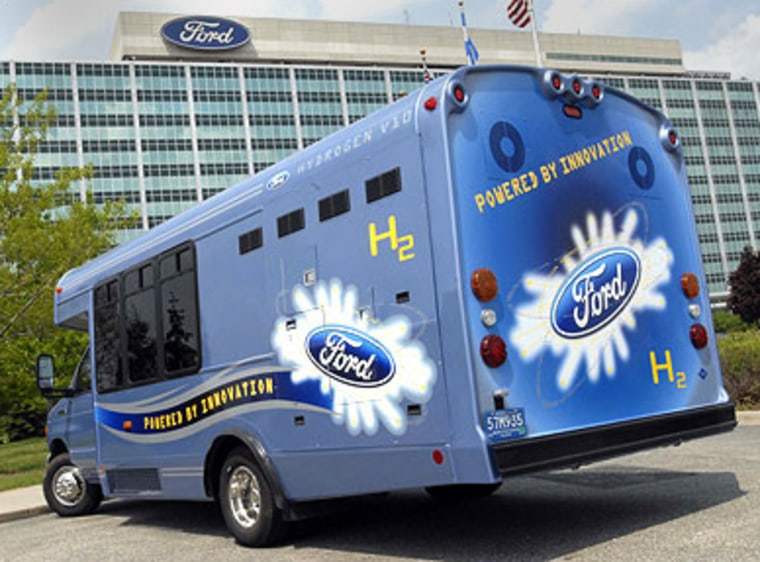Florida's only hydrogen station opened Wednesday for the first U.S. fleet of Ford shuttle buses powered by the alternative fuel, testing a technology that can lower greenhouse gases and eventually help wean the nation off foreign oil, Gov. Charlie Crist said.
"Today, gas prices are high — really high — and it hurts," Crist said. "We need to make sure that our citizens in Florida and our country have the opportunity to have choice — whether its hydrogen or ethanol or whatever the fuel might be."
Eight Ford Motor Co. shuttle buses will ferry customers, tourists and employees at Orlando International Airport, the Orange County Convention Center and other tourist spots throughout central Florida, said Sharon Fields, transportation supervisor at the convention center.
Florida got its first hydrogen-powered bus from Ford two years ago, but it took since then to build the station, officials said.
Florida has four of the 12-passenger vehicles from Ford now and will receive four more of the Ford E-450 buses later, said Sue Cischke, a Ford senior vice president. The state is paying $250,000 each for the $1 million-plus vehicles — the same cost as a traditional shuttle — under a deal with Ford.
The commercial shuttle buses can travel 150 to 200 miles before refueling, Cischke said. One of the hydrogen-fueled buses releases about 1 percent of the carbon dioxide released by a Toyota Prius, a gasoline-electric hybrid, she said.
The shuttles get five to 10 miles per gallon, equivalent to the mileage of diesel powered buses, said Nick Twork, Ford technology spokesman.
The Chevron hydrogen station is one of the first located in the Southeast and allows for experts to assess the commercial feasibility of hydrogen as a transportation fuel, Crist said. Progress Energy, which provides electrical power to millions of customers throughout Florida, North Carolina and South Carolina, donated the nearly four acres for the station site, Jeff Lyash, the energy company's president said.
Chevron Corp. has five hydrogen fueling centers nationwide, said Rick Zalesky, a Chevron vice president.
"We think the energy demand will increase by 40 percent over the next two decades," Zalesky said. "And hydrogen is an exciting new technology that will help meet that demand."
Power for the Ford E-450 shuttle buses is provided by an internal combustion engine that has been modified to run only on hydrogen fuel. Hydrogen combustion combines the gas with air to create a clean-burning energy — water is the only significant exhaust emission.
But hydrogen-powered vehicles won't be crowding the highways for at least another decade or two. That is because there are few hydrogen fueling stations around the country and it will take significant investment to build a nationwide network.
The Orlando station will be a hydrogen hub in central Florida, Crist said. Another station will open in about two months in Oviedo and will fuel six Ford Focus cars to be driven by the state and Progress Energy.
Ford delivered five of the buses to Canada in 2006. The company plans to deliver 30 of the buses throughout North America by the end of the year.
